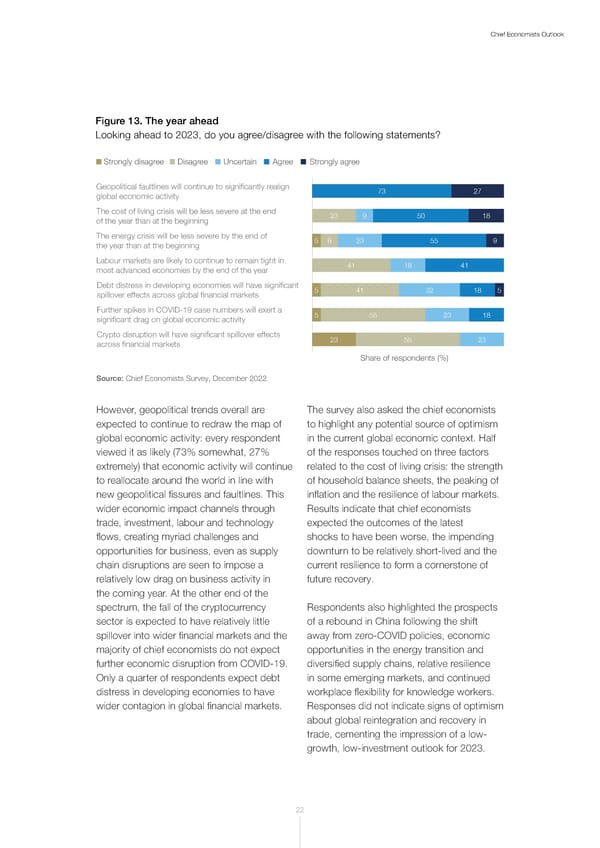22 Chief Economists Outlook Figure 13. The year ahead Looking ahead to 2023, do you agree/disagree with the following statements? Share of respondents (%) Geopolitical faultlines will continue to significantly realign global economic activity The cost of living crisis will be less severe at the end of the year than at the beginning The energy crisis will be less severe by the end of the year than at the beginning Debt distress in developing economies will have significant spillover effects across global financial markets Further spikes in COVID-19 case numbers will exert a significant drag on global economic activity Crypto disruption will have significant spillover effects across financial markets Labour markets are likely to continue to remain tight in most advanced economies by the end of the year 23 55 23 5 55 23 18 5 41 32 18 5 41 18 41 5 9 23 55 9 23 9 50 18 73 27 Strongly disagree Disagree Uncertain Agree Strongly agree Source: Chief Economists Survey, December 2022 However, geopolitical trends overall are expected to continue to redraw the map of global economic activity: every respondent viewed it as likely (73% somewhat, 27% extremely) that economic activity will continue to reallocate around the world in line with new geopolitical fissures and faultlines. This wider economic impact channels through trade, investment, labour and technology flows, creating myriad challenges and opportunities for business, even as supply chain disruptions are seen to impose a relatively low drag on business activity in the coming year. At the other end of the spectrum, the fall of the cryptocurrency sector is expected to have relatively little spillover into wider financial markets and the majority of chief economists do not expect further economic disruption from COVID-19. Only a quarter of respondents expect debt distress in developing economies to have wider contagion in global financial markets. The survey also asked the chief economists to highlight any potential source of optimism in the current global economic context. Half of the responses touched on three factors related to the cost of living crisis: the strength of household balance sheets, the peaking of inflation and the resilience of labour markets. Results indicate that chief economists expected the outcomes of the latest shocks to have been worse, the impending downturn to be relatively short-lived and the current resilience to form a cornerstone of future recovery. Respondents also highlighted the prospects of a rebound in China following the shift away from zero-COVID policies, economic opportunities in the energy transition and diversified supply chains, relative resilience in some emerging markets, and continued workplace flexibility for knowledge workers. Responses did not indicate signs of optimism about global reintegration and recovery in trade, cementing the impression of a low- growth, low-investment outlook for 2023.
 WEF Chief Economists Outlook 2023 Page 21 Page 23
WEF Chief Economists Outlook 2023 Page 21 Page 23